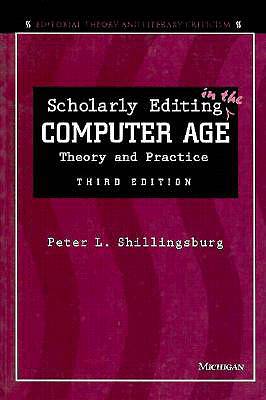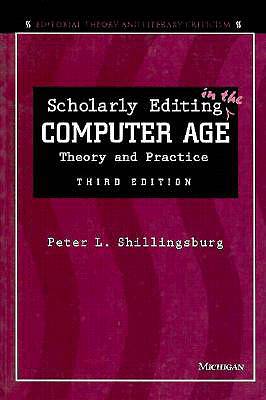
Je cadeautjes zeker op tijd in huis hebben voor de feestdagen? Kom langs in onze winkels en vind het perfecte geschenk!
- Afhalen na 1 uur in een winkel met voorraad
- Gratis thuislevering in België vanaf € 30
- Ruim aanbod met 7 miljoen producten
Je cadeautjes zeker op tijd in huis hebben voor de feestdagen? Kom langs in onze winkels en vind het perfecte geschenk!
- Afhalen na 1 uur in een winkel met voorraad
- Gratis thuislevering in België vanaf € 30
- Ruim aanbod met 7 miljoen producten
Zoeken
Omschrijving
Most readers, including professional literary academics, spend little time wondering about the state of the texts they are using. Yet the nature and status of texts, and the method of their editing, have profound effects on the ways they can be read. Scholarly Editing in the Computer Age introduces the basic vocabulary of textual criticism, demonstrates how literary criticism suffers from ignorance of textual processes, and offers practical advice on the preparation, presentation, and uses of scholarly editions.
Over the last decade, a major shift in the goals of scholarly editing has occurred, and the field has moved to acknowledge multiple texts and process as the editorial goal. Developments in electronic text presentation have released editors from the limitations and presuppositions about text imposed by the nature of printed books. And developments in literary criticism, including "new historicism," intertextuality, and contextualism, have put demands on editors to produce editions adequate for the new questions being asked of texts. This third edition of Scholarly Editing in the Computer Age has been thoroughly revised and updated to address current debates and controversies in the field.
The volume is divided into three parts. Part 1, Theory, explores eight crucial concepts that affect the planning and execution of scholarly editions. Part 2, Practice, focuses on how the different views of editorial concerns influence selections of copy-text (or base text), how they influence an editor's emendation policy, and how they affect the arrangement and scope of textual apparatus. Part 3, Practicalities, explores the practical problems facing all scholarly editors, regardless of the theories they follow, and outlines ways in which computer technology has changed production processes and presentation options for scholarly editions.
In earlier editions, Scholarly Editing in the Computer Age has been repeatedly praised for the clarity with which it presents the range of editorial problems and the varieties of approaches to their solution. This new edition will prove an essential resource for students of scholarly editing and for anyone interested in the close relationship between textual criticism and literary criticism.
Peter L. Shillingsburg is Professor of English, University of North Texas
Over the last decade, a major shift in the goals of scholarly editing has occurred, and the field has moved to acknowledge multiple texts and process as the editorial goal. Developments in electronic text presentation have released editors from the limitations and presuppositions about text imposed by the nature of printed books. And developments in literary criticism, including "new historicism," intertextuality, and contextualism, have put demands on editors to produce editions adequate for the new questions being asked of texts. This third edition of Scholarly Editing in the Computer Age has been thoroughly revised and updated to address current debates and controversies in the field.
The volume is divided into three parts. Part 1, Theory, explores eight crucial concepts that affect the planning and execution of scholarly editions. Part 2, Practice, focuses on how the different views of editorial concerns influence selections of copy-text (or base text), how they influence an editor's emendation policy, and how they affect the arrangement and scope of textual apparatus. Part 3, Practicalities, explores the practical problems facing all scholarly editors, regardless of the theories they follow, and outlines ways in which computer technology has changed production processes and presentation options for scholarly editions.
In earlier editions, Scholarly Editing in the Computer Age has been repeatedly praised for the clarity with which it presents the range of editorial problems and the varieties of approaches to their solution. This new edition will prove an essential resource for students of scholarly editing and for anyone interested in the close relationship between textual criticism and literary criticism.
Peter L. Shillingsburg is Professor of English, University of North Texas
Specificaties
Betrokkenen
- Auteur(s):
- Uitgeverij:
Inhoud
- Aantal bladzijden:
- 208
- Taal:
- Engels
- Reeks:
Eigenschappen
- Productcode (EAN):
- 9780472066001
- Verschijningsdatum:
- 26/08/1996
- Uitvoering:
- Paperback
- Formaat:
- Trade paperback (VS)
- Afmetingen:
- 152 mm x 227 mm
- Gewicht:
- 344 g

Alleen bij Standaard Boekhandel
+ 68 punten op je klantenkaart van Standaard Boekhandel
Beoordelingen
We publiceren alleen reviews die voldoen aan de voorwaarden voor reviews. Bekijk onze voorwaarden voor reviews.









